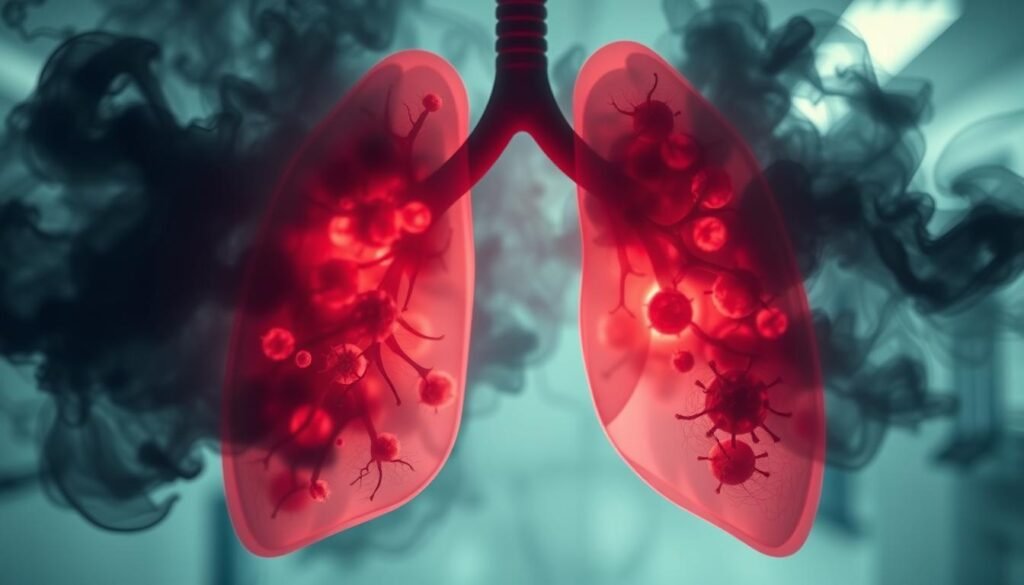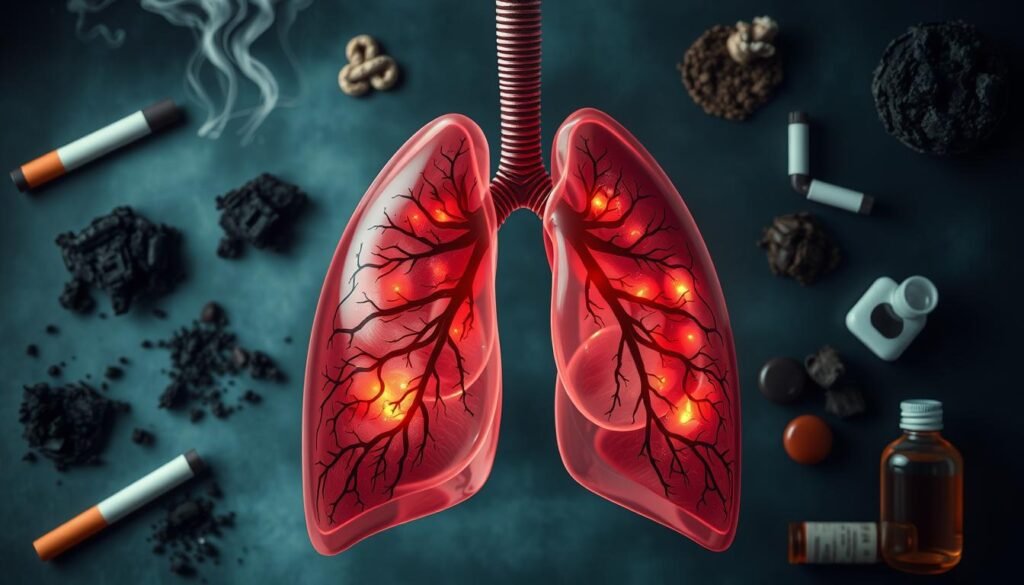Every year, over 30 million visits to doctors in the U.S. are due to persistent coughs. Though often just a body’s way of responding to irritants, a lasting cough might signal lung cancer. People hardly notice the chronic cough and other symptoms until the cancer advances. If your cough changes or doesn’t go away, seeing a doctor right away is critical.
The link between coughing and lung cancer is complex, but understanding it is key. This article explores possible signs, how they differ, and when to see a doctor. Knowing these signs early can be crucial for timely treatment and better outcomes.
Key Takeaways
- A persistent cough can be an important symptom of lung cancer.
- Most lung cancer symptoms appear only after significant progression of the disease.
- Routine checks are essential, as early diagnosis significantly enhances treatment outcomes.
- Common lung cancer symptoms include coughing up blood, chest pain, and unexplained weight loss.
- Individuals experiencing chronic coughing should seek medical advice promptly.
Understanding Coughing as a Symptom
Coughing is an essential reflex that keeps our airways clear. But knowing when coughing is normal or not is key for health. A cough that lasts more than eight weeks can be serious. It might mean conditions like lung cancer. It’s important to tell the difference between regular and serious coughing. This way, people can get the help they need.
What is a Chronic Cough?
A chronic cough lasts more than eight weeks. Normal coughs are short and help get rid of things that irritate us. But, a long-term cough can point to serious health problems. Research shows that 65% of those with lung cancer had a cough at first. And this number goes up to 80% or more in late-stage cancer. However, lung cancer is a rare cause of chronic coughing.
Normal vs. Abnormal Coughing
Normal coughing is quick and protects our lungs. But if a cough doesn’t go away or gets worse, it’s not normal. An abnormal cough may last more than eight weeks. It can be dry or wet. And it might come with scary signs like coughing up blood, chest pain, or trouble breathing.
Seeing a doctor is crucial if your cough is like this. Doctors might do tests or send you to a specialist to find out why you’re coughing. Knowing these signs helps us look after our health better. It shows when we need to get help. For more details, check out this page.
Is Coughing a Sign of Lung Cancer?
Coughing can be a warning sign for lung cancer. Many studies link a lasting cough to lung cancer risk. When a cough sticks around, it’s worth paying more attention to your lung health.
The Connection Between Cough and Lung Cancer
About half the people diagnosed with lung cancer had a chronic cough. This symptom is important to note. It’s vital to tell the difference between common coughs and ones pointing to lung cancer. If a cough keeps up or gets worse, it might mean lung cancer is present.
Statistics on Coughing and Lung Cancer Diagnosis
The stats help us understand how coughing and lung cancer are related. Below are some statistics that highlight their connection:
| Statistic | Details |
|---|---|
| Prevalence of Chronic Cough | About 50% of people with lung cancer have a chronic cough when diagnosed. |
| Other Causes of Chronic Cough | Ninety percent of chronic cough cases come from asthma, postnasal drip, and GERD. |
| Coughing Up Blood | Between 7% and 35% of lung cancer patients cough up blood at diagnosis. |
| Radon Exposure | Radon is the second chief cause of lung cancer, found in 1 out of 15 U.S. homes. |
| Annual Deaths Due to Radon | Radon-related lung cancer causes 15,000 to 22,000 deaths in the U.S. each year. |
Finding symptoms like a lasting cough early can help with treatment. Getting checked soon is vital due to the potential risks shown in these statistics.
Common Lung Cancer Symptoms
Knowing common lung cancer symptoms is crucial for quick action. A lasting cough is a clear warning sign. If it goes on for more than eight weeks, it’s a worry. Such symptoms disrupt daily life and push people to get medical help.
Persistent Cough and Its Duration
A long-lasting cough could point to lung cancer. It might come with other worrisome signs. People might find their cough gets worse after a cold, or they get bronchitis or pneumonia often.
Other Associated Symptoms
There are more signs besides a constant cough. These include:
- Coughing up blood or rust-colored mucus
- Chest pain when tumors press on nerves
- Shortness of breath from tight airways
- Unexplained weight loss
- Hoarseness due to vocal cord problems
Understanding these symptoms helps people act fast and get the right help. Catching lung cancer early can improve chances of a better result.
The Different Types of Coughs
Coughing can be for different reasons, dividing into dry cough and productive cough. Knowing the difference helps spot health issues. A lung cancer cough, for example, may start as dry but become productive, signaling the illness.
Dry Cough vs. Productive Cough
A dry cough doesn’t produce mucus and might come from allergies, asthma, or irritants. On the other hand, a productive cough produces mucus, showing there might be an infection or another illness. It’s crucial to tell them apart to identify what your cough means.
Recognizing a Lung Cancer Cough
A lung cancer cough starts dry and might turn productive. You may cough up blood or colored sputum. Spotting these signs early leads to quicker medical help.

| Cough Type | Characteristics | Possible Causes |
|---|---|---|
| Dry Cough | No mucus production, irritating sensation | Allergies, asthma, irritants |
| Productive Cough | Mucus or phlegm production, persistent | Infections, lung disease, lung cancer |
It’s key to understand the differences between dry and productive coughs. This knowledge is especially important for symptoms that could be related to lung cancer. Being aware helps ensure early diagnosis and treatment.
Additional Lung Cancer Warning Signs
Knowing early symptoms of lung cancer is key for a fast diagnosis and treatment. Look out for signs like coughing up blood, severe chest pain, and trouble breathing. These may show a more serious issue needing a doctor’s check-up.
Coughing Up Blood and Mucus Changes
Coughing up blood, or hemoptysis, is a troubling sign of possible lung problems. This might happen with changes in the color or thickness of mucus, such as rust-colored spit. Studies say that many people with lung cancer cough a lot, often with blood. This shows how important it is to look into these symptoms more.
Chest Pain and Breathing Difficulties
Chest pain is a common lung cancer symptom. It can get worse with deep breaths or coughs. If you find it hard to breathe and have chest pain, it might mean a tumor is blocking your airways. People, especially those at high risk, should get medical help if they have ongoing chest pain or trouble breathing. Catching it early means more options for treatment, so knowing these signs is crucial.
For more on lung cancer symptoms, check out this article for common signs. Another resource with early warning info can be found here.
What Causes Lung Cancer Coughing?
Lung cancer coughing is usually caused by tumors and other health issues. These tumors can irritate or block airways, leading to coughing. Knowing these causes helps identify serious health problems early.
How Tumors Affect the Airways
Tumors in the lungs can make the airways sore. This soreness often leads to a continuous cough. It’s a way for the body to try and remove what’s blocking the air. Studies show that about 65% of lung cancer patients have a constant cough at diagnosis.
For advanced lung cancer, this number goes up to 80% or more. These facts underline the importance of getting a persistent cough checked by a doctor early on.
Infection and Inflammation Contributions
Infections and inflammation can make a lot of mucus build up in the airways. This makes coughing worse, adding to lung cancer’s symptoms. Coughs over eight weeks old need to be looked into to rule out lung cancer.
Less than 2% of these long coughs are because of lung cancer. But, coughs from infections can be mistaken for lung cancer coughs. Knowing the difference is key for a timely and correct diagnosis.

Lung Cancer Risk Factors
Understanding lung cancer risk factors is vital for prevention and early diagnosis. Smoking is the leading cause of lung cancer, greatly increasing risk. Also, being exposed to asbestos and radon can raise your chances of getting this serious illness.
The Role of Smoking
About 80% to 90% of lung cancers worldwide are caused by smoking. If you smoke, you’re 15 to 30 times more likely to develop lung cancer than non-smokers. Even secondhand smoke is dangerous. Smoking, along with other carcinogens, can escalate the risk significantly. It’s crucial to understand these dangers and find ways to lower them.
Environmental Influences: Asbestos and Radon
Being around harmful substances like asbestos and radon increases lung cancer risk. Asbestos, used in building and insulation, is dangerous when breathed in. Radon gas, a natural radioactive gas in many homes, also threatens lung health over time. These factors make it important to be aware of the air quality in your environment.
| Risk Factor | Increased Risk Level |
|---|---|
| Smoking | 15 to 30 times higher |
| Asbestos Exposure | Significantly raises risk |
| Radon Gas | Increases risk when combined with smoking |
| Secondhand Smoke | Increased risk for non-smokers |
When to Seek Medical Attention
Knowing when to get help for a cough is key. If it lasts more than eight weeks, it’s serious. If you’re coughing up blood, losing a lot of weight, or have bad chest pain, see a doctor right away.
Duration of Cough and Associated Symptoms
How long a cough lasts tells a lot. Acute coughs are short, under two months, and often from colds or allergies. Chronic coughs go on for over eight weeks and can mean bigger issues, like lung cancer. Most people with lung cancer had a chronic cough first, showing why it’s vital to notice this symptom.
Importance of Early Diagnosis
Finding lung cancer early makes treatment work better. Knowing when to see a doctor can lead to early action, lessening the chance of bad outcomes. Lung cancer is the top cause of cancer death, so pay attention to your cough. Quick steps toward treatment can mean better chances of beating it.

Treatment Options for Lung Cancer Cough
Treating lung cancer cough is key to better life quality for those with this symptom. About 57% of lung cancer patients suffer from coughing. So, managing it effectively is crucial.
Medications to Manage Coughing
Medications are vital in easing the cough linked to lung cancer. Patients have several options:
- Cough suppressants: These lessen the urge to cough, offering relief.
- Bronchodilators: They make the airways bigger, aiding in easier breathing and lessening coughing.
- Opioids: For tough cases, doctors might use opioids to help with the cough.
The choice of cough medicine depends on how bad the cough is and its effect on daily life. Open talks with doctors are essential to find the best lung cancer cough treatment plan.
Therapies to Reduce Cough Symptoms
Other than medicines, different therapies help relieve cough symptoms. These options include:
- Inhalers: They get medicine right to the lungs for quick relief.
- Nebulizers: These turn liquid medicine into mist, which is easy to breathe in.
- Physical therapies: Exercises and chest therapy help clear mucus and improve breathing.
These therapies complement cough medicines. Each therapy offers unique benefits for lung cancer patients. Knowing about treatment options is crucial for patient care.
Conclusion
Understanding the link between coughing and lung cancer is key. It’s crucial for spreading awareness about lung cancer. If you cough a lot, especially with signs like chest pain, losing weight, or coughing up blood, it could be lung cancer. Knowing these signs helps people get checked out sooner. This is vital for better treatment outcomes.
About 47% of lung cancer patients find out they have it late. This is often after coughing or other symptoms for a long while. If coughing or something else seems off, seeing a doctor quickly matters. Catching cancer early can save lives by finding it before it gets worse.
Lung cancer is a leading cause of cancer deaths in the U.S. Knowing and sharing info about its symptoms can help. Coughing might be more than just a cold or allergy. Taking action by getting checked can help you stay healthy. It also helps everyone by catching lung cancer early in others.